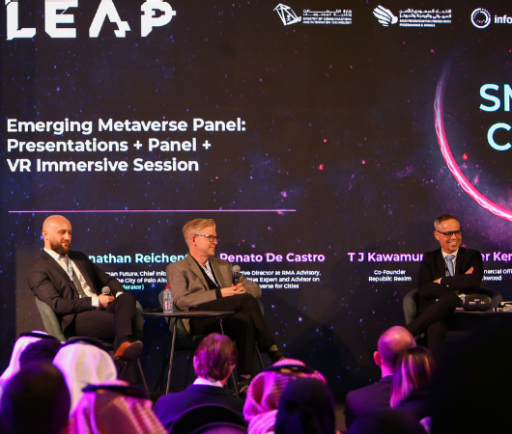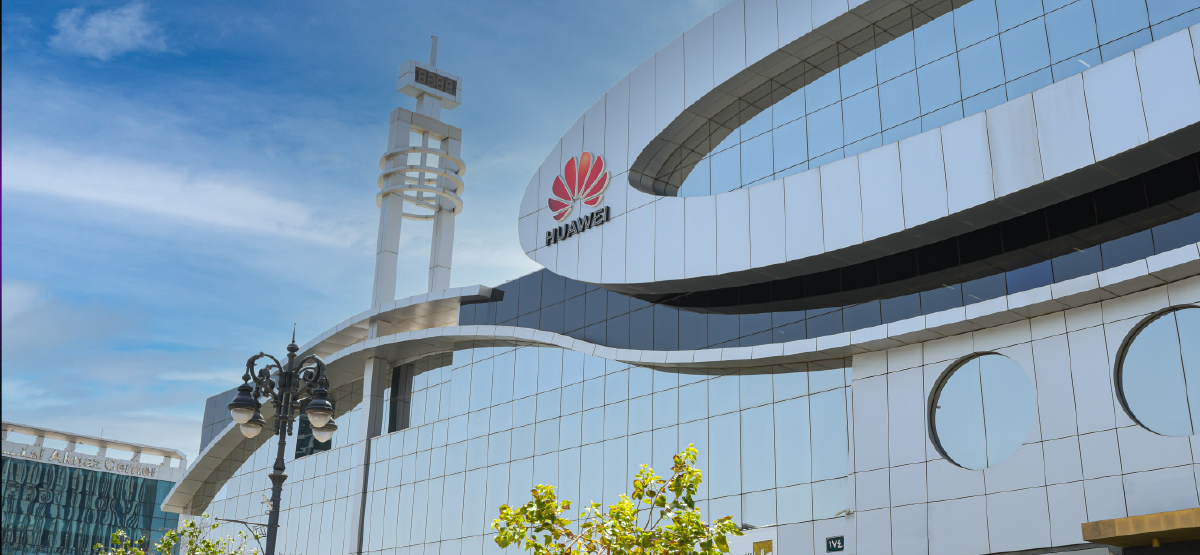
It Starts With Data
How AI can bring forth a world of responsible opportunities By Daniela Braga, PhD Artificial intelligence (AI) may be the

Laying the groundwork for a digital-led economic transformation for Saudi Arabia
Saudi Arabia’s leadership recognizes that the future is digital, and the country has positioned digital transformation as the cornerstone for nation-building. This commitment has seen investments in technology continue to accelerate, with the Kingdom’s information and communications technology (ICT) market reaching US$40.9 billion in 2022, according to the latest report released by the Communications, Space, and Technology Commission (CST). The developments helped consolidate Saudi Arabia’s position as the largest ICT market in MENA.
The National Strategy for Digital Transformation guides this digital future, establishing a framework for digital transformation in sectors including finance, commerce, logistics, and information technology. The final phase now underway -the Smart Government Strategy- aims to create a new seamless government experience for beneficiaries by 2024.
In line with this action plan, several government bodies have established regulatory sandboxes using digital technologies to allow businesses and startups to experiment in a controlled environment. The Saudi Central Bank (SAMA) maintains one of the most active sandboxes, which aims to boost the financial sector and transform the Kingdom into a smart financial hub. SAMA has so far admitted 38 companies into its sandbox, while providing licenses to several businesses that use fintech in their operations.
Saudi Arabia has also encouraged artificial intelligence (AI) usage to achieve Vision 2030 and Smart Government Strategy objectives. This focus has set Saudi Arabia on a rapid AI adoption phase, with investment in artificial intelligence set to reach $135.2 billion by 2030, which is estimated to contribute 12.4% to the Kingdom’s gross domestic product (GDP). As part of this process, Saudi Arabia intends to educate and establish a reservoir of 20,000 AI and data experts, including 5,000 highly qualified AI scientists.
To accelerate this journey, Saudi Arabia has launched a series of global technology events to bring technology leaders to the Kingdom. The biggest of these is LEAP, which made its debut last year, attracting more than 100,000 attendees over three days. Riyadh also hosted the Global AI Summit last year, which witnessed various partnerships between global technology leaders and several Saudi-based companies to develop AI solutions.

Saudi Arabia is also engaged in in-depth cooperation with leading cloud computing companies, including Huawei Cloud. Huawei Cloud is Huawei’s cloud service brand. It makes Huawei’s over three decades of expertise in ICT and digitalization available to customers, partners, and developers from all over the world. Huawei Cloud provides reliable, secure, and ever evolving cloud services to them all.
During the LEAP event last year, Huawei Cloud announced it would launch a cloud region in Saudi Arabia to boost local businesses and the government’s ability to access more robust and secure cloud services.
Huawei Cloud followed this with a recent announcement to bolster investments in cloud and smart infrastructure in the Kingdom, including plans to establish smart industrial infrastructure in key cities in the nation, along with further cloud computing investments.
This focus is based on the realization that the cloud is the foundation of digital transformation, and the driver of a dynamic digital world. It also provides the building blocks for other advanced technologies driving our digital world, such as AI, internet of things (IoT), and more.
To help customers migrate to the cloud smoothly and use it well once they are there, to give them quick access to leading technologies on the cloud, and to support its mission to help customers unleash the power of digital, Huawei Cloud advocates an Everything as a Service model, which includes Infrastructure-as-a-Service, Technology-as-a-Service, and Expertise-as-a-Service.
For example, with years of steady investment into AI, Huawei Cloud has launched a range of leading AI products, such as the AI development pipeline ModelArts, large pre-trained Pangu models, digital human, and spatiotemporal computing services. ModelArts is a one-stop AI development platform that covers every phase of developing an AI application, including data processing, algorithm development, model training, model management, and model deployment.
According to IDC, ModelArts has been No. 1 in China’s machine learning as a public cloud service market for five times running. The large, pre-trained machine learning models under the Pangu brand have shown superior performance in generalization, universality, transfer learning, as well as few-shot and zero-shot learning. They help promote inclusive AI by accelerating and lowering the costs of industrial scale AI development.
In the data governance domain, Huawei Cloud provides a data governance pipeline, DataArts; a one-stop data development and governance platform where big data and AI converge. This platform includes Huawei Cloud GaussDB, a cloud database service, Huawei Cloud FusionInsight, an intelligent data lake solution, and Huawei Cloud GaussDB(DWS), a cloud data warehouse service. They help enterprises build a data foundation for digital transformation and maximize the value of data.
To help government agencies and large enterprises in sectors like energy leverage AI and other digital technologies while ensuring security and compliance, Huawei Cloud has created the Huawei Cloud Stack solution. This solution brings a broad set of cloud services, such as AI, big data, and database, to the customer premises. That way they can enjoy quick access to the latest technologies, while also ensuring the security of their core data assets.
Huawei Cloud Stack also includes a range of scenario-specific solutions, including e-Government cloud, Smart City, and electric power IoT. According to IDC, Huawei Cloud Stack is currently being used by over 4,800 enterprise customers from over 150 countries, and it is the top player in many markets or segments in China, such as financial cloud, software-defined computing, and cloud management.

With Huawei Cloud Stack and AI services, Huawei Cloud has helped organizations from several countries, including Saudi Arabia, accelerate digital transformation and embrace AI. In Saudi Arabia’s future cities, Huawei Cloud provides an AI-powered spatiotemporal computing service that can create digital models of the entire city 300% faster than traditional methods. This helps city managers quickly develop and deploy intelligent services.
Using a cognitive computing platform powered by Huawei Cloud’s AI technologies, the China National Petroleum Corporation (CNPC) has been able to use AI to improve productivity in a number of important tasks, such as seismic data interpretation, well log interpretation, geophysical exploration and processing, well drilling and completion, and reservoir engineering. The time it takes to discover oil and gas reservoirs has been reduced by around 70%, with an accuracy of over 90%. Seismic data interpretation now takes just a week, instead of a month. Well log interpretation has been accelerated from a whole day to just 10 minutes for a single well.
By using an AI-aided drug design service powered by Huawei Cloud’s Pangu Drug Molecule Model, Professor Liu Bing of the Imperial College London and his team quickly developed a new broad-spectrum antimicrobial drug called Drug X. The Pangu Drug Molecule Model accelerated the discovery of lead compounds from several years to just one month, and slashed R&D costs by 70%.
Shenzhen Airport used AI algorithms from Huawei Cloud to quickly build over 60 dispatching and scheduling rules, which enable automatic, intelligent allocation of aircraft stands in the airport. The new intelligent platform also tracks the status of passenger boarding bridges (PBBs) and all flight support nodes to automatically identify operational security risks.
The Pangu meteorological model can predict long-term weather more accurately than traditional agencies (such as the European Centre for Medium-Range Weather Forecasts), and 10,000 times faster, thanks to the use of 3D neural networks, layered spatiotemporal aggregation, as well as extensive training on large datasets.
We’re confident that both public and private organizations in Saudi Arabia will benefit from Huawei’s leading position in cloud technologies.
The CST report also identified the fast rollout of 5G as among the key drivers for Saudi’s rapid IC growth, with the country among the first worldwide to implement 5G. The next milestone for Saudi Arabia is to accelerate the journey to the intelligent world through 5.5G, which will deliver 10 Gbit/s experiences, support hundreds of billions of connections, and help achieve native intelligence.
Huawei first proposed an outline for 5.5G in 2020, and 3GPP officially named the concept “5G-Advanced” in 2021. As an upgraded version of 5G, 5.5G features will power future industry scenarios such as input/output virtualization (IoV), IoT, robotics, and manufacturing, and serve as a key driving force of the digital economy. 5.5G will upgrade network capabilities by 10x, support 10 Gbps experience, and enable 100 billion connections and native intelligence for numerous services. In short, 5.5G is necessary to build an intelligent world.
The above is just the latest of recent partnerships between Huawei and Saudi organizations. Last year, the Saudi Ministry of Communications and Information Technology (MCIT) and Huawei signed a memorandum of understanding (MoU) to enhance cooperation in ICT. The partnership will see the Ministry and Huawei collaborating to realize a “10Gbps Society,” seeking to build a superfast broadband infrastructure to support the digital transformation goals of Saudi Vision 2030. These improvements will also enhance the competitiveness of Saudi ICT infrastructure globally.
Towards this end, Huawei will leverage its global expertise and success stories to support the Saudi Arabia Ministry of Communications and Information Technology (MCIT) in finalizing the business case and designing the required regulations to accelerate the 10Gbps Society goal. An initial 10GB district pilot will be launched this year.
Additionally, Huawei announced a collaboration with the Saudi Space Agency to launch Future Space, the first technology experience center in Saudi Arabia. The partnership aligns with Huawei’s commitment to corporate social responsibility, developing local talent, and actively contributing to the Kingdom’s digital transformation journey. Future Space, the largest exhibition center outside of China, will include advanced technologies, including autonomous driving, 3D printing, and brainwave robot control, among other innovations.
The Saudi Arabia Ministry of Transport and Huawei also signed an MoU to enhance future mobility and technology adoption in the transport and logistics sector by exploring advanced technologies such as 5G, AI, and big data. As per the agreement, Huawei will provide automation, big data, and digitization solutions. It will also contribute to delivering solutions for shared mobility, sustainability, and disruptive technology in developing the logistics sector and intelligent transport systems in the Kingdom.
Talent development is another area of continued focus for Huawei. Clearly, collaboration between tech companies, industry, academia, and government is the most viable path for advancing ICT skills in the Kingdom. At Huawei, we use our expertise and technologies to develop digital talent and enhance digital literacy in KSA.
One of the most impactful of Huawei’s skills development initiatives is the Huawei ICT Competition Middle East. During the 2022 edition, the two Saudi teams received the “Outstanding Performance” award following months of national and regional competitions between some of the region’s brightest young minds and leading academic institutions.
These advances are helping redefine a new world. Technology has erased national boundaries by enhancing communications and cultural exchanges between people worldwide. That is why Huawei advocates for globalization as opposed to protectionist policies adopted by some countries. Instead, we should recommit to opening more collaboration opportunities for all.
Ultimately, Huawei remains committed to providing innovative digital transformation solutions in Saudi Arabia to support the country’s development agenda and vision. Our technology, expertise, and commitment to shared success is a model for creating a sustainable, open and intelligent world.
Discover the most outstanding articles.اكتشف أبرز المقالات.

Harnessing the power of digital twins to reimagine cities across the KSA and beyond. According to PwC’s 2022 report,

How Riyadh-based The Garage is contributing to a flourishing startup culture in Saudi Arabia In the heart of Riyadh, nestled

Saudi astronauts Rayyanah Barnawi and Ali Alqarni make history in giant leap for the kingdom. From earthbound dreamers to cosmic